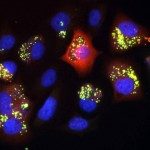Link to Pubmed [PMID] – 10051449
Biochem. J. 1999 Mar;338 ( Pt 3):753-60
A series of mutants bearing single amino acid substitutions often encountered in the catalase/peroxidase, KatG, from isoniazid-resistant isolates of Mycobacterium tuberculosis has been produced by site-directed mutagenesis. The resultant enzymes were overexpressed, purified and characterized. Replacing Cys-20 by Ser abolished disulphide-bridge formation, but did not affect either dimerization of the enzyme or catalysis. The substitution of Thr-275, which is probably involved in electron transfer from the haem, by proline resulted in a highly unstable enzyme with insignificant enzyme activities. The most commonly occurring substitution in drug-resistant clinical isolates is the replacement of Ser-315 by Thr; this lowered catalase and peroxidase activities by 50% and caused a significant decrease in the KatG-mediated inhibition of the activity of the NADH-dependent enoyl-[acyl-carrier protein] reductase, InhA, in vitro. The ability of this enzyme to produce free radicals from isoniazid was severely impaired, as judged by its loss of NitroBlue Tetrazolium reduction activity. Replacement of Leu-587 by Pro resulted in marked instability of KatG, indicating that the C-terminal domain is also important for structural and functional integrity.

